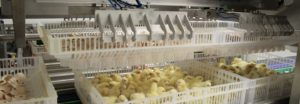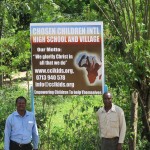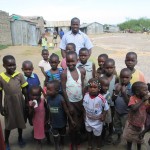Building a Self-Sufficient and Eco-Friendly Children’s Village:
The Vision of Chosen Children International is to build self-sufficient and eco-friendly children’s Villages that will transform the societies within which they exist. The Villages will be not only for the children that will benefit from it but for all the adults in the community as well.
The Kenyan government partnered with us by donating 20 acres of land to CCI on which to build our first Children’s Village. The land is in a remote area that is very undeveloped in a village called Kwanza. Kwanza’s nearest town is Kitale in Trans- Nzoia County. Kitale is known as the breadbasket of Kenya since many farmers bring their maize, the staple crop in Kenya, to be sold in Kitale.
We aim to help develop Kwanza by building this model Children’s Village. In keeping with our mission of empowering impoverished communities to help themselves, much of what we plan to do on our property involves training both adults and children so they can have a livelihood and be able to support their families. We have a large piece of property whereby we intend to train local farmers on productive farming and animal husbandry. Very soon we are planning on installing a chicken hatchery that will produce baby chicks for the community. Along with providing a source for the community to obtain baby chickens, we will provide the training on how to care for these chicks, and we will sell the farmers the vitamins and nutrients that the chicks need to protect them from dying. Too often people in Kenya embark on a business that they are not equipped to run. Training is key to their success.

Many of the men of Kwanza are alcoholics and not working at all. This puts an incredibly hard burden upon the women of the area to be the bread winners of the family. Not only do they have to provide daily food but they struggle also to pay the necessary school fees so their children can be educated. There is no free education In Kenya and for families with several children paying school fees is very difficult especially when the husbands are not gainfully employed.
The 12 step program for alcoholic men and women:
In October 2019 When CCI founder and Director Marilyn Cohn found out through a woman’s leader of Kwanza of the plight of the heads of households suffering from alcoholism, she immediately enacted a 12 step recovery program in the area. The program first trains men and women leaders who act as mentors to these addicts. The people in recovery come together as a support group and they are eventually given a sponsor or a mentor to help guide them through the steps. Many men in the area drink because they have no jobs nor livelihood and they feel worthless and bored. Therefore we will train these men to raise chickens and other animals, and to raise productive crops, at the same time as they are involved in the 12 step program of recovery.
The plan for educating and housing the children:
Our Children’s Village when it is finished shall include 12 homes for 12 orphans each with either a married couple or two widows. We will house only genuine orphans who have no other relatives to stay with. The children in these homes shall feel the love of a family environment. They will not be in dormitories but rather they will be in a family unit. We will have schools from Early Childhood Education (ECD or pre-school) through high school and technical college. Our schools will provide quality education for all the children in the community in addition to the 144 children who will live in our Model Village. Children in Kenya who graduate from either 8th grade or high school without further training will not be able to support themselves. This is the reason the technical college will be very important to the entire community. We want every child who comes to our model Village to have not just an academic education but a trade. At our technical college will we teach carpentry and masonry, computer science, tailoring, animal husbandry, and agriculture among other trades. All of the children living on our property will also have their own garden which they will learn to cultivate and they will be taking care of the animals on our property as part of their education. CCI has already built and operated 5 schools starting with a school for street children and including ECD, primary and high school.

The use of ecologically friendly resources:
The model for our first village and all subsequent ones is for us to use only renewable resources. We will be using solar power and hydro power for electricity. We already have been using solar power in our offices. We have our own well on our property and will be digging more wells around the property. We also intend to turn maize oil( corn oil) into bio fuel that can be used to run all of our vehicles and also we will cook with it. On one of the properties we own where we built a church and a school, we have been using eco-friendly toilets as well as solar power and our own water system. We intend to use these also on the property in Kwanza.
A health Clinic:
In all of Kwanza there is only one district hospital which often doesn’t have the drugs that are needed to treat people. As part of our Children’s Village we will build our own health clinic which will provide low cost health care to the entire community. It will also ensure the children that are living on our property and the students who come from the community, will be able to get regular medical attention. In an impoverished community like Kwanza many people do not seek out any medical help due to lack of funds.
Income Generating Businesses for Self-Sufficiency:
In order for the Children’s Village to be self-sufficient and pay for all its needs we will use a holistic approach where- by we will grow enough food to feed the children and also we will crow cash crops to sell to the community. In addition to the agriculture we will be gaining income from the cows, goats, chickens and fish ponds that will be on our property. At our tailoring school we will be making school uniforms and other clothes that we will also sell to the community as a source of income in order to pay our staff.


